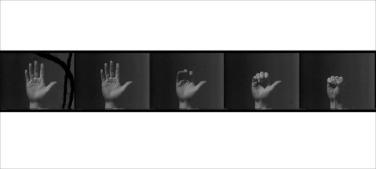Image: Filmtract R106 (1968)

Image: Filmtract R106 (1968)
Europe, future past is a project on durable images. Images of resistance. Images that are resistant to remaining fixed in the past. Images in the future past. Images from the past that play a part in shaping the present.
At a time when a neo-liberal Europe is experiencing an unprecedented social and political crisis, various contemporary visual and artistic practices are looking back to the militant cinema archive from the "long 60s", the turbulent historical period started by the international cycle of struggles in 1968 and their subsequent lives throughout the 70s. The Europe, future past project proposes reflecting on this trans-historical dialogue through research and a public programme of activities which will include a season of projections and artistic interventions, a participatory audiovisual workshop, an international symposium and the online publication of unpublished works by international artists, film makers and thinkers.
The foundations of the current Europe - financial, debtocratic Europe, the Europe of inequality, fortress Europe - were built on the defeat of the social movements in the long 60s. From the violent outbursts in 68 to the Athens Polytechnic uprising, from the Portuguese Carnation revolution to the struggles of the factories and workers’ districts in late-Francoist Spain and the transition, from the mass strikes in the United Kingdom in the 70s to the "Hot Autumn" turmoil and the autonomous movements in Italy. The political future of Europe was at stake in these struggles. A confrontation that would be resolved under the dictum of there is no alternative, demobilising the grass root democratic initiatives and imposing neo-liberal economic orthodoxy.
The militant cinema archive of the long 60s is a visual map of a Europe that could be: a map of resistance and radical political imagination, a map that looks towards the Global South, a map of discussions and inclusive democracy, a map of new political subjectivities - of gender, class, post-colonialism and environmentalism. Militant cinema was cinema that was out of place. Light equipment made it possible to move filming and projecting towards the spaces of social revolt. The demand for radical democracy resulted in new forms of collective, participatory authorship. Cinema became a space for experimentation around the politicisation of images and their modes of production.
The Europe, future past project will explore transfers between the militant film archive and contemporary visual and artistic practices. It is no coincidence that, at the time of the current crisis, various artists, film makers and audiovisual collectives are transforming and rethinking the legacy of militant film making practices of this period as a way of political intervention in the present reality. We will attend to the meeting and handling of the archive, the reuse of its devices of representation, the reinterpretation of its participatory modes of production, the appropriation, discussion or critical rejection of its strategies of politicising images. So, the legacy of the militant cinema of the long 60s is revealed as a fundamental source for understanding contemporary critical visual practices.
The residency will take place in three separate periods, from February 8 to march 10, from April 18 to May 18 and from September 12 to October 12, 2016.
